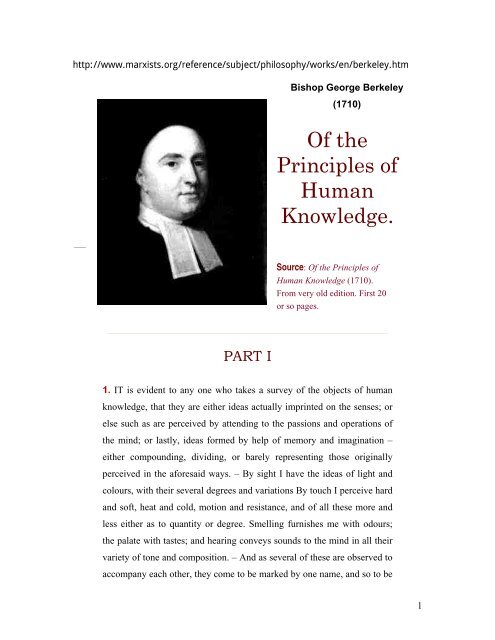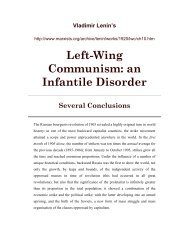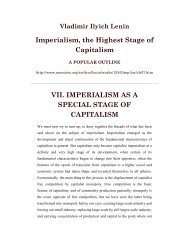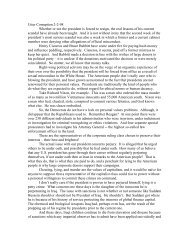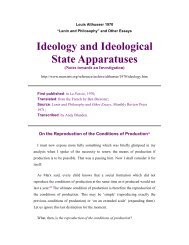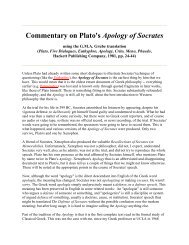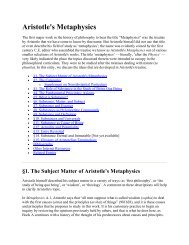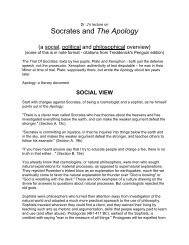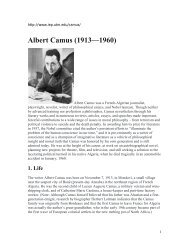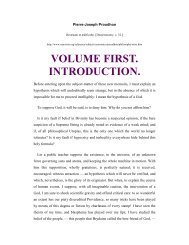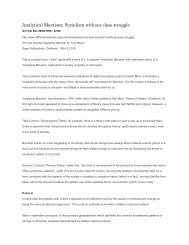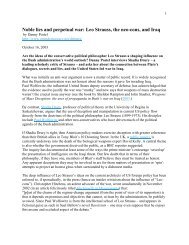Berkeley - Principles of Human Understanding 1-30 - Richard Curtis
Berkeley - Principles of Human Understanding 1-30 - Richard Curtis
Berkeley - Principles of Human Understanding 1-30 - Richard Curtis
Create successful ePaper yourself
Turn your PDF publications into a flip-book with our unique Google optimized e-Paper software.
http://www.marxists.org/reference/subject/philosophy/works/en/berkeley.htm<br />
Bishop George <strong>Berkeley</strong><br />
(1710)<br />
Of the<br />
<strong>Principles</strong> <strong>of</strong><br />
<strong>Human</strong><br />
Knowledge.<br />
Source: Of the <strong>Principles</strong> <strong>of</strong><br />
<strong>Human</strong> Knowledge (1710).<br />
From very old edition. First 20<br />
or so pages.<br />
PART I<br />
1. IT is evident to any one who takes a survey <strong>of</strong> the objects <strong>of</strong> human<br />
knowledge, that they are either ideas actually imprinted on the senses; or<br />
else such as are perceived by attending to the passions and operations <strong>of</strong><br />
the mind; or lastly, ideas formed by help <strong>of</strong> memory and imagination –<br />
either compounding, dividing, or barely representing those originally<br />
perceived in the aforesaid ways. – By sight I have the ideas <strong>of</strong> light and<br />
colours, with their several degrees and variations By touch I perceive hard<br />
and s<strong>of</strong>t, heat and cold, motion and resistance, and <strong>of</strong> all these more and<br />
less either as to quantity or degree. Smelling furnishes me with odours;<br />
the palate with tastes; and hearing conveys sounds to the mind in all their<br />
variety <strong>of</strong> tone and composition. – And as several <strong>of</strong> these are observed to<br />
accompany each other, they come to be marked by one name, and so to be<br />
1
eputed as one THING. Thus, for example, a certain colour, taste, smell,<br />
figure and consistence having been observed to go together, are accounted<br />
one distinct thing, signified by the name apple; other collections <strong>of</strong> ideas<br />
constitute a stone, a tree, a book, and the like sensible things – which as<br />
they are pleasing or disagreeable excite the passions <strong>of</strong> love, hatred, joy,<br />
grief, and so forth.<br />
2. But, besides all that endless variety <strong>of</strong> ideas or objects <strong>of</strong> knowledge,<br />
there is likewise something which knows or perceives them; and exercises<br />
divers operations, as willing, imagining, remembering, about them. This<br />
perceiving, active being is what I call MIND, SPIRIT, SOUL, or<br />
MYSELF. By which words I do not denote any one <strong>of</strong> my ideas, but a<br />
thing entirely distinct from them, wherein they exist, or, which is the same<br />
thing, whereby they are perceived – for the existence <strong>of</strong> an idea consists in<br />
being perceived.<br />
3. That neither our thoughts, nor passions, nor ideas formed by the<br />
imagination, exist without the mind, is what everybody will allow —And<br />
to me it is no less evident that the various SENSATIONS, or ideas<br />
imprinted on the sense, however blended or combined together (that is,<br />
whatever objects they compose), cannot exist otherwise than in a mind<br />
perceiving them – I think an intuitive knowledge may be obtained <strong>of</strong> this<br />
by any one that shall attend to what is meant by the term exist when<br />
applied to sensible things. The table I write on I say exists, that is, I see<br />
and feel it; and if I were out <strong>of</strong> my study I should say it existed - meaning<br />
thereby that if I was in my study I might perceive it, or that some other<br />
spirit actually does perceive it. There was an odour, that is, it was smelt;<br />
there was a sound, that is, it was heard; a colour or figure, and it was<br />
perceived by sight or touch. This is all that I can understand by these and<br />
the like expressions. – For as to what is said <strong>of</strong> the absolute existence <strong>of</strong><br />
unthinking things without any relation to their being perceived, that is to<br />
me perfectly unintelligible Their esse is percipi, nor is it possible they<br />
2
should have any existence out <strong>of</strong> the minds or thinking things which<br />
perceive them.<br />
4. It is indeed an opinion strangely prevailing amongst men, that houses,<br />
mountains, rivers, and in a word all sensible objects, have an existence,<br />
natural or real, distinct from their being perceived by the understanding.<br />
But, with how great an assurance and acquiescence soever this principle<br />
may be entertained in the world, yet whoever shall find in his heart to call<br />
it in question may, if I mistake not, perceive it to involve a manifest<br />
contradiction. For, what are the forementioned objects but the things we<br />
perceive by sense? and what do we perceive besides our own ideas or<br />
sensations? and is it not plainly repugnant that any one <strong>of</strong> these, or any<br />
combination <strong>of</strong> them, should exist unperceived?<br />
5. If we thoroughly examine this tenet it will, perhaps, be found at bottom<br />
to depend on the doctrine <strong>of</strong> abstract ideas. For can there be a nicer strain<br />
<strong>of</strong> abstraction than to distinguish the existence <strong>of</strong> sensible objects from<br />
their being perceived, so as to conceive them existing unperceived ? Light<br />
and colours, heat and cold, extension and figures – in a word the things we<br />
see and feel – what are they but so many sensations, notions, ideas, or<br />
impressions on the sense? and is it possible to separate, even in thought,<br />
any <strong>of</strong> these from perception? For my part, I might as easily divide a thing<br />
from itself. I may, indeed, divide in my thoughts, or conceive apart from<br />
each other, those things which, perhaps, I never perceived by sense so<br />
divided Thus, I imagine the trunk <strong>of</strong> a human body without the limbs, or<br />
conceive the smell <strong>of</strong> a rose without thinking on the rose itself. So far, I<br />
will not deny, I can abstract – if that may properly be called abstraction<br />
which extends only to the conceiving separately such objects as it is<br />
possible may really exist or be actually perceived asunder. But my<br />
conceiving or imagining power does not extend beyond the possibility <strong>of</strong><br />
real existence or perception. Hence, as it is impossible for me to see or<br />
feel anything without an actual sensation <strong>of</strong> that thing, so is it impossible<br />
3
for me to conceive in my thoughts any sensible thing or object distinct<br />
from the sensation or perception <strong>of</strong> it.<br />
6. Some truths there are so near and obvious to the mind that a man need<br />
only open his eyes to see them Such I take this important one to be, viz.<br />
that all the choir <strong>of</strong> heaven and furniture <strong>of</strong> the earth, in a word all those<br />
bodies which compose the mighty frame <strong>of</strong> the world, have not any<br />
subsistence without a mind - that their being is to be perceived or known;<br />
that consequently so long as they are not actually perceived by me, or do<br />
not exist in my mind or that <strong>of</strong> any other created spirit, they must either<br />
have no existence at all, or else subsist in the mind <strong>of</strong> some Eternal Spirit<br />
– -it being perfectly unintelligible, and involving all the absurdity <strong>of</strong><br />
abstraction, to attribute to any single part <strong>of</strong> them any existence<br />
independent <strong>of</strong> a spirit. To be convinced <strong>of</strong> which, the reader need only<br />
reflect, and try to separate in his own thoughts the being <strong>of</strong> a sensible<br />
thing from its being perceived.<br />
7. From what has been said it is evident there is not any other Substance<br />
than SPIRIT, or that which perceives. But, for the fuller demonstration <strong>of</strong><br />
this point, let it be considered the sensible qualities are colour, figure,<br />
motion, smell, taste, etc, i.e. the ideas perceived by sense. Now, for an<br />
idea to exist in an unperceiving thing is a manifest contradiction; for to<br />
have an idea is all one as to perceive; that therefore wherein colour,<br />
figure, etc exist must perceive them; hence it is clear there can be no<br />
unthinking substance or substratum <strong>of</strong> those ideas.<br />
8. But, say you, though the ideas themselves do not exist without the<br />
mind, yet there may be things like them, where<strong>of</strong> they are copies or<br />
resemblances, which things exist without the mind in an unthinking<br />
substance. I answer, an idea can be like nothing but an idea; a colour or<br />
figure can be like nothing but another colour or figure. If we look but<br />
never so little into our own thoughts, we shall find it impossible for us to<br />
4
conceive a likeness except only between our ideas. Again, I ask whether<br />
those supposed originals or external things, <strong>of</strong> which our ideas are the<br />
pictures or representations, be themselves perceivable or no? If they are,<br />
then they are ideas and we have gained our point; but if you say they are<br />
not, I appeal to any one whether it be sense to assert a colour is like<br />
something which is invisible; hard or s<strong>of</strong>t, like something which is<br />
intangible; and so <strong>of</strong> the rest.<br />
9. Some there are who make a distinction betwixt, primary and secondary<br />
qualities'. By the former they mean extension, figure, motion, rest,<br />
solidity, impenetrability, and number; by the latter they denote all other<br />
sensible qualities, as colours, sounds, tastes, and so forth The ideas we<br />
have <strong>of</strong> these last they acknowledge not to be the resemblances <strong>of</strong><br />
anything existing without the mind, or unperceived, but they will have our<br />
ideas <strong>of</strong> the primary qualities to be patterns or images <strong>of</strong> things which<br />
exist without the mind, in an unthinking substance which they call matter.<br />
- By Matter, therefore, we are to understand an inert, senseless substance,<br />
in which extension, figure and motion do actually subsist. But it is<br />
evident, from what we have already shewn, that extension, figure, and<br />
motion are only ideas existing in the Mind, and that an idea can be like<br />
nothing but another idea, and that consequently neither they nor their<br />
archetypes can exist in an unperceiving substance. Hence, it is plain that<br />
the very notion <strong>of</strong> what is called Matter or corporeal substance involves a<br />
contradiction in it.<br />
10. They who assert that figure, motion, and the rest <strong>of</strong> the primary or<br />
original qualities do exist without the mind, in unthinking substances, do<br />
at the same time acknowledge that colours, sounds, heat, cold, and<br />
suchlike secondary qualities, do not – which they tell us are sensations<br />
existing in the mind alone, that depend on and are occasioned by the<br />
different size, texture, and motion <strong>of</strong> the minute particles <strong>of</strong> matter. This<br />
they take for an undoubted truth, which they can demonstrate beyond all<br />
5
exception. Now, if it be certain that those original qualities are inseparably<br />
united with the other sensible qualities, and not, even in thought, capable<br />
<strong>of</strong> being abstracted from them, it plainly follows that they exist only in the<br />
mind But I desire any one to reflect and try whether he can, by any<br />
abstraction <strong>of</strong> thought, conceive the extension and motion <strong>of</strong> a body<br />
without all other sensible qualities. For my own part, I see evidently that it<br />
is not in my power to frame an idea <strong>of</strong> a body extended and moving, but I<br />
must withal give it some colour or other sensible quality which is<br />
acknowledged to exist only in the mind In short, extension, figure, and<br />
motion, abstracted from all other qualities, are inconceivable. Where<br />
therefore the other sensible qualities are, there must these be also, to wit,<br />
in the mind and nowhere else.<br />
11. Again, great and small, swift and slow, are allowed to exist nowhere<br />
without the mind, being entirely relative, and changing as the frame or<br />
position <strong>of</strong> the organs <strong>of</strong> sense varies. The extension therefore which<br />
exists without the mind is neither great nor small, the motion neither swift<br />
nor slow, that is, they are nothing at all But, say you, they are extension in<br />
general, and motion in general thus we see how much the tenet <strong>of</strong><br />
extended moveable substances existing without the mind depends on that<br />
strange doctrine <strong>of</strong> abstract ideas. And here I cannot but remark how<br />
nearly the vague and indeterminate description <strong>of</strong> Matter or corporeal<br />
substance, which the modern philosophers are run into by their on by<br />
principles, resembles that antiquated and so much ridiculed notion <strong>of</strong><br />
materia prima, to be met with in Aristotle and his followers. Without<br />
extension solidity cannot be conceived; since therefore it has been shewn<br />
that extension exists not in an unthinking substance, the same must also be<br />
true <strong>of</strong> solidity.<br />
12. That number is entirely the creature <strong>of</strong> the mind, even though the<br />
other qualities be allowed to exist without, it will be evident to whoever<br />
considers that the same thing bears a different denomination <strong>of</strong> number as<br />
6
the mind views it with different respects Thus, the same extension is one,<br />
or three, or thirty-six, according as the mind considers it with reference to<br />
a yard, a foot, or an inch. Number is so visibly relative, and dependent on<br />
men's understanding, that it is strange to think how any one should give it<br />
an absolute existence without the mind. We say one book, one page, one<br />
line, etc.; all these are equally units, though some contain several <strong>of</strong> the<br />
others. And in each instance, it is plain, the unit relates to some particular<br />
combination <strong>of</strong> ideas arbitrarily put together by the mind.<br />
13. Unity I know some will have to be a simple or uncompounded idea,<br />
accompanying all other ideas into the mind That I have any such idea<br />
answering the word unity I do not find; and if I had, methinks I could not<br />
miss finding it on the contrary, it should be the most familiar to my<br />
understanding, since it is said to accompany all other ideas, and to be<br />
perceived by all the ways <strong>of</strong> sensation and reflection To say no more, it is<br />
an abstract idea.<br />
14. I shall further add, that, after the same manner as modern philosophers<br />
prove certain sensible qualities to have no existence in Matter, or without<br />
the mind, the same thing may be likewise proved <strong>of</strong> all other sensible<br />
qualities whatsoever. Thus, for instance, it is said that heat and cold are<br />
affections only <strong>of</strong> the mind, and not at all patterns <strong>of</strong> real beings existing<br />
in the corporeal substances which excite them, for that the same body<br />
which appears cold to one hand seems warm to another. Now, why may<br />
we not as well argue that figure and extension are not patterns or<br />
resemblances <strong>of</strong> qualities existing in Matter, because to the same eye at<br />
different stations, or eyes <strong>of</strong> a different texture at the same station, they<br />
appear various, and cannot therefore be the images <strong>of</strong> anything settled and<br />
determinate without the mind? Again, it is proved that sweetness is not<br />
really in the sapid thing, because the thing remaining unaltered the<br />
sweetness is changed into bitter, as in case <strong>of</strong> a fever or otherwise vitiated<br />
palate. Is it not as reasonable to say that motion is not without the mind,<br />
7
since if the succession <strong>of</strong> ideas in the mind become swifter the motion, it<br />
is acknowledged, shall appear slower without any alteration in any<br />
external object.<br />
15. In short, let any one consider those arguments which are thought<br />
manifestly to prove that colours and tastes exist only in the mind, and he<br />
shall find they may with equal force be brought to prove the same thing <strong>of</strong><br />
extension, figure, and motion – Though it must be confessed this method<br />
<strong>of</strong> arguing does not so much prove that there is no extension or colour in<br />
an outward object, as that we do not know by sense which is the true<br />
extension or colour <strong>of</strong> the object But the arguments foregoing plainly<br />
shew it to be impossible that any colour or extension at all, or other<br />
sensible quality whatsoever, should exist in an unthinking subject without<br />
the mind, or in truth, that there should be any such thing as an outward<br />
object.<br />
16. But let us examine a little the received opinion – It is said extension is<br />
a mode or accident [or Attribute] <strong>of</strong> Matter, and that Matter is the<br />
substratum that supports it. Now I desire that you would explain to me<br />
what is meant by Matter's supporting extension. Say you, I have no idea<br />
<strong>of</strong> Matter and therefore cannot explain it. I answer, though you have no<br />
positive, yet, if you have any meaning at all, you must at least have a<br />
relative idea <strong>of</strong> Matter; though you know not what it is, yet you must be<br />
supposed to know what relation it bears to accidents, and what is meant by<br />
its supporting them It is evident 'support' cannot here be taken in its usual<br />
or literal sense – as when we say that pillars support a building; in what<br />
sense therefore must it be taken?<br />
17. If we inquire into what the most accurate philosophers declare<br />
themselves to mean by material substance, we shall find them<br />
acknowledge they have no other meaning annexed to those sounds but the<br />
idea <strong>of</strong> being in general. together with the relative notion <strong>of</strong> its supporting<br />
8
accidents. The general idea <strong>of</strong> Being appeareth to me the most abstract<br />
and incomprehensible <strong>of</strong> all other; and as for its supporting accidents,<br />
thus, as we have just now observed, cannot be understood in the common<br />
sense <strong>of</strong> those words; it must therefore be taken in some other sense, but<br />
what that is they do not explain. So that when I consider the two parts or<br />
branches which make the signification <strong>of</strong> the words material substance, I<br />
am convinced there is no distinct meaning annexed to them. But why<br />
should we trouble ourselves any farther, in discussing this material<br />
substratum or 'support' <strong>of</strong> figure, and motion, and other sensible qualities?<br />
Does it not suppose they have an existence without the mind? And is not<br />
this a direct repugnancy, and altogether inconceivable?<br />
18. But, though it were possible that solid, figured, moveable substances<br />
may exist without the mind, corresponding to the ideas we have <strong>of</strong> bodies,<br />
yet how is it possible for us to know this? Either we must know it by<br />
Sense or by Reason – As for our senses, By them we have the knowledge<br />
only <strong>of</strong> our sensations, ideas, or those things that are immediately<br />
perceived by sense, call them what you will: but they do not inform us<br />
that things exist without the mind, or unperceived, like to those which are<br />
perceived. This the Materialists themselves acknowledge. – It remains<br />
therefore that if we have any knowledge at all <strong>of</strong> external things, it must<br />
be by Reason inferring their existence from what is immediately perceived<br />
by sense But what reason can induce us to believe the existence <strong>of</strong> bodies<br />
without the mind, from what we perceive, since the very patrons <strong>of</strong> Matter<br />
themselves do not pretend there is any necessary connection betwixt them<br />
and our ideas? I say it is granted on all hands-and what appears in dreams,<br />
frenzies, and the like, puts it beyond dispute – that it is possible we might<br />
be affected with all the ideas we have now, though there were no bodies<br />
existing without resembling them. Hence, it is evident the supposition <strong>of</strong><br />
external bodies is not necessary for the producing our ideas; since it is<br />
granted they are produced sometimes, and might possibly be produced<br />
9
always in the same order we see them in at present, without their<br />
concurrence.<br />
19. But, though we might possibly have all our sensations without them,<br />
yet perhaps it may be thought easier to conceive and explain the manner<br />
<strong>of</strong> their production, by supposing external bodies in their likeness rather<br />
than otherwise; and so it might be at least probable there are such things<br />
as bodies that excite their ideas in our minds. But neither can this be said;<br />
for, though we give the materialists their external bodies, they by their<br />
own confession are never the nearer knowing how our ideas are produced;<br />
since they own themselves unable to comprehend in what manner body<br />
can act upon spirit, or how it is possible it should imprint any idea in the<br />
mind. Hence it is evident the production <strong>of</strong> ideas or sensations in our<br />
minds can be no reason why we should suppose Matter or corporeal<br />
substances, since that is acknowledged to remain equally inexplicable<br />
with or without this supposition. If therefore it were possible for bodies to<br />
exist without the mind, yet to hold they do so must needs be a very<br />
precarious opinion; since it is to suppose, without any reason at all, that<br />
God has created innumerable beings that are entirely useless, and serve to<br />
no manner <strong>of</strong> purpose.<br />
20. In short, if there were external bodies, it is impossible we should ever<br />
come to know it; and if there were not, we might have the very same<br />
reasons to think there were that we have now. Suppose – what no one can<br />
deny possible – an intelligence without the help <strong>of</strong> external bodies, to be<br />
affected with the same train <strong>of</strong> sensations or ideas that you are, imprinted<br />
in the same order and with like vividness in his mind. I ask whether that<br />
intelligence hath not all the reason to believe the existence <strong>of</strong> corporeal<br />
substances, represented by his ideas, and exciting them in his mind, that<br />
you can possibly have for believing the same thing ? Of this there can be<br />
no question – which one consideration were enough to make any<br />
10
easonable person suspect the strength <strong>of</strong> whatever arguments he may<br />
think himself to have, for the existence <strong>of</strong> bodies without the mind.<br />
21. Were it necessary to add any farther pro<strong>of</strong> against the Existence <strong>of</strong><br />
Matter, after what has been said, I could instance several <strong>of</strong> those errors<br />
and difficulties (not to mention impieties) which have sprung from that<br />
tenet. It has occasioned numberless controversies and disputes in<br />
philosophy, and not a few <strong>of</strong> far greater moment in religion. But I shall<br />
not enter into the detail <strong>of</strong> them in this place, as well because I think<br />
arguments a posteriori are unnecessary for confirming what has been, if I<br />
mistake not sufficiently demonstrated a priori, as because I shall hereafter<br />
find occasion to speak somewhat <strong>of</strong> them.<br />
22. I am afraid I have given cause to think I am needlessly prolix in<br />
handling this subject For, to what purpose is it to dilate on that which may<br />
be demonstrated with the utmost evidence in a line or two, to any one that<br />
is capable <strong>of</strong> the least reflection? It is but looking into your own thoughts,<br />
and so trying whether you can conceive it possible for a sound, or figure,<br />
or motion, or colour to exist without the mind or unperceived. This easy<br />
trial may perhaps make you see that what you contend for is a downright<br />
contradiction. Insomuch that I am content to put the whole upon this issue<br />
– if you can but conceive it possible for one extended moveable<br />
substance, or, in general, for any one idea, or anything like an idea, to<br />
exist otherwise than in a mind perceiving it, I shall readily give up the<br />
cause. And, as for all that compages <strong>of</strong> external bodies you contend for, I<br />
shall grant you its existence, though you cannot either give me any reason<br />
why you believe it exists, or assign any use to it when it is supposed to<br />
exist I say, the bare possibility <strong>of</strong> your opinions being true shall pass for<br />
an argument that it is so.<br />
23. But, say you, surely there is nothing easier than for me to imagine<br />
trees, for instance, in a park, or books existing in a closet, and nobody by<br />
11
to perceive them. I answer, you may so, there is no difficulty in it; but<br />
what is all this, I beseech you, more than framing in your mind certain<br />
ideas which you call books and trees, and at the same time omitting to<br />
frame the idea <strong>of</strong> any one that may perceive them? But do not you<br />
yourself perceive or think <strong>of</strong> them all the while? This therefore is nothing<br />
to the purpose it only shews you have the power <strong>of</strong> imagining or forming<br />
ideas in your mind; but it does not shew that you can conceive it possible<br />
the objects <strong>of</strong> your thought may exist without the mind. To make out this,<br />
it is necessary that you conceive them existing unconceived or unthought<br />
<strong>of</strong>, which is a manifest repugnancy. When we do our utmost to conceive<br />
the existence <strong>of</strong> external bodies, we are all the while only contemplating<br />
our own ideas. But the mind, taking no notice <strong>of</strong> itself, is deluded to think<br />
it can and does conceive bodies existing unthought <strong>of</strong> or without the mind,<br />
though at the same time they are apprehended by or exist in itself. A little<br />
attention will discover to any one the truth and evidence <strong>of</strong> what is here<br />
said, and make it unnecessary to insist on any other pro<strong>of</strong>s against the<br />
existence <strong>of</strong> material substance.<br />
24. It is very obvious, upon the least inquiry into our own thoughts, to<br />
know whether it be possible for us to understand what is meant by the<br />
absolute existence <strong>of</strong> sensible objects in themselves, or without the mind.<br />
To me it is evident those words mark out either a direct contradiction, or<br />
else nothing at all. And to convince others <strong>of</strong> this, I know no readier or<br />
fairer way than to entreat they would calmly attend to their own thoughts;<br />
and if by this attention the emptiness or repugnancy <strong>of</strong> those expressions<br />
does appear, surely nothing more is requisite for their conviction. It is on<br />
this therefore that I insist, to wit, that the absolute existence <strong>of</strong> unthinking<br />
things are words without a meaning, or which include a contradiction.<br />
This is what I repeat and inculcate, and earnestly recommend to the<br />
attentive thoughts <strong>of</strong> the reader.<br />
12
25. All our ideas, sensations, notions, or the things which we perceive, by<br />
whatsoever names they may be distinguished, are visibly inactive – there<br />
is nothing <strong>of</strong> Power or Agency included in them So that one idea or object<br />
<strong>of</strong> thought cannot produce or make any alteration in another.<br />
- To be satisfied <strong>of</strong> the truth <strong>of</strong> this, there is nothing else requisite but a<br />
bare observation <strong>of</strong> our ideas. For, since they and every part <strong>of</strong> them exist<br />
only in the mind, it follows that there is nothing in them but what is<br />
perceived; but whoever shall attend to his ideas, whether <strong>of</strong> sense or<br />
reflection, will not perceive in them any power or activity; there is,<br />
therefore, no such thing contained in them A little attention will discover<br />
to us that the very being <strong>of</strong> an idea implies passiveness and inertness in it,<br />
insomuch that it is impossible for an idea to do anything, or, strictly<br />
speaking, to be the cause <strong>of</strong> anything neither can it be the resemblance or<br />
pattern <strong>of</strong> any active being, as is evident from sect 8. Whence it plainly<br />
follows that extension, figure, and motion cannot be the cause <strong>of</strong> our<br />
sensations. To say, therefore, that these are the effects <strong>of</strong> powers resulting<br />
from the configuration, number, motion, and size <strong>of</strong> corpuscles, must<br />
certainly be false.<br />
26. We perceive a continual succession <strong>of</strong> ideas, some are anew excited,<br />
others are changed or totally disappear There is therefore some Cause <strong>of</strong><br />
these ideas, whereon they depend, and which produces and changes them.<br />
That this cause cannot be any quality, or idea, or combination <strong>of</strong> ideas is<br />
clear from the preceding section. It must therefore be a substance; but it<br />
has been shewn that there is no corporeal or material substance: it remains<br />
therefore that the cause <strong>of</strong> ideas is an incorporeal active substance or<br />
Spirit.<br />
27. A Spirit is one simple, undivided, active being – as it perceives ideas<br />
it is called the <strong>Understanding</strong>, and as it produces or otherwise operates<br />
about them it is called the Will. Hence there can be no idea formed <strong>of</strong> a<br />
13
soul or spirit; for, all ideas whatever, being passive and inert, (vid sect<br />
25,) cannot represent unto us, by way <strong>of</strong> image or likeness, that which<br />
acts. A little attention will make it plain to any one that to have an idea<br />
which shall be like that active principle <strong>of</strong> motion and change <strong>of</strong> ideas is<br />
absolutely impossible. Such is the nature <strong>of</strong> Spirit, or that which acts; that<br />
it cannot be <strong>of</strong> itself perceived, but only by the effects which it produceth.<br />
– If any man shall doubt <strong>of</strong> the truth <strong>of</strong> what is here delivered, let him but<br />
reflect and try if we can frame the idea <strong>of</strong> any Power or Active Being; and<br />
whether he has ideas <strong>of</strong> two principal powers, marked by the names Will<br />
and <strong>Understanding</strong>, distinct from each other, as well as from a third idea<br />
<strong>of</strong> Substance or Being in general, with a relative notion <strong>of</strong> its supporting<br />
or being the subject <strong>of</strong> the aforesaid powers which is signified by the<br />
name Soul or Spirit. This is what some hold; but, so far as I can see, the<br />
words will, soul, spirit, do not stand for different ideas, or, in truth, for<br />
any idea at all, but for something which is very different from ideas, and<br />
which, being an Agent, cannot be like unto, or represented by, any idea<br />
whatsoever. [Though it must be owned at the same time that we have<br />
some notion <strong>of</strong> soul, spirit, and the operations <strong>of</strong> the mind; such as<br />
willing, loving, hating – inasmuch as we know or understand the meaning<br />
<strong>of</strong> these words].<br />
28. I find I can excite ideas in my mind at pleasure, and vary and shift the<br />
scene as <strong>of</strong>t as I think fit. It is no more than willing, and straightway this<br />
or that idea arises in my fancy; and by the same power it is obliterated and<br />
makes way for another. This making and unmaking <strong>of</strong> ideas doth very<br />
properly denominate the mind active. Thus much is certain and grounded<br />
on experience: but when we talk <strong>of</strong> unthinking agents, or <strong>of</strong> exciting ideas<br />
exclusive <strong>of</strong> Volition, we only amuse ourselves with words.<br />
29. But, whatever power I may have over my own thoughts, I find the<br />
ideas actually perceived by Sense have not a like dependence on my will,<br />
when in broad daylight I open my eyes, it is not in my power to choose<br />
14
whether I shall see or no, or to determine what particular objects shall<br />
present themselves to my view; and so likewise as to the hearing and other<br />
senses, the ideas imprinted on them are not creatures <strong>of</strong> my will. There is<br />
therefore some other Will or Spirit that produces them.<br />
<strong>30</strong>. The ideas <strong>of</strong> Sense are more strong, lively, and distinct than those <strong>of</strong><br />
the Imagination; they have likewise a steadiness, order, and coherence,<br />
and are not excited at random, as those Which are the effects <strong>of</strong> human<br />
wills <strong>of</strong>ten are, but in a regular train or series – the admirable connection<br />
where<strong>of</strong> sufficiently testifies the wisdom and benevolence <strong>of</strong> its Author<br />
Now the set rules or established methods wherein the Mind we depend on<br />
excites in us the ideas <strong>of</strong> sense, are called the laws <strong>of</strong> nature; and these we<br />
learn by experience, which teaches us that such and such ideas are<br />
attended with such and such other ideas, in the ordinary course <strong>of</strong> things.<br />
31. This gives us a sort <strong>of</strong> foresight which enables us to regulate our<br />
actions for the benefit <strong>of</strong> life. And without this we should be eternally at a<br />
loss; we could not know how to act anything that might procure us the<br />
least pleasure, or remove the least pain <strong>of</strong> sense. That food nourishes sleep<br />
refreshes, and fire warms us; that to sow in the seedtime is the way to reap<br />
in the harvest; and in general that to obtain such or such ends, such or<br />
such means are conducive – all this we know, not by discovering any<br />
necessary connection between our ideas, but only by the observation <strong>of</strong><br />
the settled laws <strong>of</strong> nature, without which we should be all in uncertainty<br />
and confusion, and a grown man no more know how to manage himself in<br />
the affairs <strong>of</strong> life than an infant just born.<br />
15


